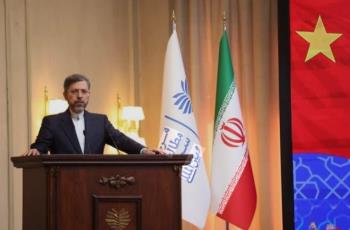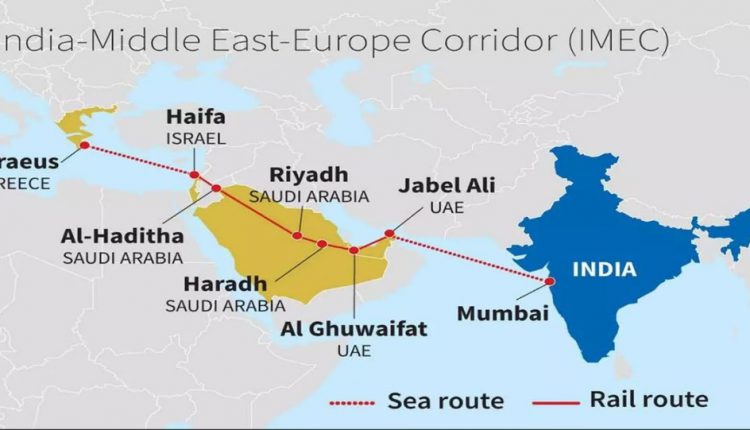Alwaght- In an increasingly interwoven world, any geopolitical dispute leaves its effects on the global economy. The ongoing Israeli war on Gaza, though with limited extent, is expected to have negative effects on the world economy as the world community is involved in this dispute.
The first repercussions of the Gaza war can well be seen in one of the American-advocated strategic economic projects for West Asia region. The ‘economic corridor’ initiative that was to link India to the West Asia and Europe now faces major challenges due to the Israeli war on Gaza and there are many questions surrounding its future.
The project was unveiled during the G20 summit hosted by New Delhi in September, during which the US, Saudi Arabia, the UAE, India, France, Germany, Italy, and the European Union signed an agreement to establish it. This corridor, which includes the construction of railways, pipelines for energy transfer, and cables for data transmission, is of great economic importance.
Khaleej Online news website in a report addressed the challenges and obstacles ahead of this international corridor after Gaza war. After its launch, this project is supposed to significantly reduce transportation costs, by about 40 percent, and also increase development opportunities in the area it covers. This project consists of two corridors: the Eastern Corridor, which connects India to the Arab countries of the Persian Gulf, and the Northern Corridor, which connects the Persian Gulf countries to Europe through Jordan and Israel.
On September 17, Saudi Investment Minister Khalid bin Abdulaziz Al-Falih described the corridor as a historic project, saying: “People talk about the Silk Road and the Indian Spice Route across the Arabian Peninsula, but the new corridor will be more important because it will be associated with new energies, data, communication, human resources, flight paths and alignment between countries that have the same mentality and vision.”
The US seeking to challenge Chinese plans
Since 2021, the administration of President Joe Biden made proposals for great infrastructural projects to counter the increasing Chinese global influence, particularly in West Asia region. This project is also the peak of the American efforts to challenge China and block its plans worldwide. Washington seeks to achieve its goals behind construction of this corridor, especially that it intends to maintain its spheres of influence against China. Also, through this plan, Washington intends to integrate the Israeli regime in the Arab region and strengthen India’s position against China.
The integration of Israel in West Asia is an important issue for the US, and the economic corridor is a big step in realizing this goal, because it is supposed to eventually reach the Mediterranean from the occupied Palestinian territories. The Israeli cabinet, thus, welcomed the idea and described it as the “biggest cooperation project in history” that will change the face of the Middle East, Israel and Europe and affect the whole world. In addition to advancing the project of Israeli diplomatic normalization with Arab and Muslim countries, the economic corridor will turn Haifa port into one of the important maritime transit hubs with the help of large investments by India’s Adani Shipping Private Limited company.
The US wants to integrate the Persian Gulf states in its project while they are part of the rival Chinese Road and Belt Initiative (RBI) and have already welcomed Beijing’s initiative, and now it remains to see what side they will pick. If the Chinese project is concluded earlier, there is no doubt that any Washington efforts to beat it with a rival project will fail as the Arab countries cannot join two corridors at the same time.
Concerns about the future of economic corridor
While the American-eyed corridor is in its early stages and no more than two months have passed since it was unveiled, the changes in West Asia have triggered concerns about its feasibility.
While the world economy is still grappling with the crisis caused by the coronavirus and the consequences of Russian-Ukranian war, the Gaza war has began to cast its shadows over the world economy, making the analysts think that execution of the economic corridor is more difficult than before. Indian Finance Minister Nirmala Sitaraman on November 15 said: “It (the corridor) is not without its geopolitical challenges and the ongoing conflict in Israel and Gaza is a worrying manifestation of these.”
Gaza war has also disrupted the air traffic and many flights and air transportation across the occupied territories have been canceled, making many investment companies across the world question security of this corridor.
After Gaza war, the global oil prices also rose, consequently leading to increased gold demand, while shares of many big companies unprecedentedly dropped. For example, Adani company, which also constructs railways, saw a 5-6 percent drop in its shares on concerns about the influence of war on the Indian plans to connect its rail network to West Asia.
According to Iras Times of India, Gaza war has caused concerns about security of the corridor and led to decease in the confidence of companies and investors about success of the project and also removal of the preliminary obstacles, including the Iranian, Egyptian, and Turkish opposition. According to the Institute for Global Research initiatives, Gaza war could delay or halt plans to launch the economic corridor as long-time impacts of war are unignorable in West Asia. Therefore, Indian announcement of full solidarity with Israel and description of Hamas as a terror organization is driven by New Delhi anger with Hamas about the impacts of war on the corridor.
It is noteworthy that the Palestinian resistance groups have fired thousands of rockets at the occupied territories, especially Tel Aviv and the port of Haifa, since the beginning of Operation Al-Aqsa Storm on October 7, and due to the lack of security in the occupied territories, some commercial ships refuse to dock in these ports. Therefore, this war, which according to Tel Aviv’s officials, will last for months, can stop the implementation of the economic plans of the US and its allies.
Ambiguous fate of the project
Since the Israeli regime is party to this corridor, continuation of insecurity in the occupied territories has pushed execution of the corridor plan in mystery. Usama Ahmad Mowud, an Arab economist told Khaleej Online that Gaza war directly impacts the start of work on the economic corridor or even its feasibility assessment and in the short run will increase the costs of the project and cut its investment attractiveness for the investors.
Needless to say, foreign investors invest in corridors when they are ensured about their security, but since there is no clear perspective to stop the conflict in Gaza, in the current situation, any attempt to realize this project will go nowhere. The fleeing of tens of billions of dollars of capital from the occupied territories in recent months showed that the continuation of conflicts between Tel Aviv and the Palestinian resistance groups will make the path of foreign investment difficult.
Mawud explained that the Israeli role in this project is vital as the corridor is linked to Europe through Haifa port and then Greece’s Piraeus port.
This expert believes that the continuation of the war and the expansion of the circle of conflict can change the direction of the corridor if there is an intention to implement it without Israel. This is now unlikely, but there are still chances for its implementation even without Israel to limit China’s influence.
He also stressed that Beijing can play an active role, even diplomatically, in easing the conflict in the region or limiting its range, but any Chinese influence on the implementation of the economic corridor project or even delaying its implementation directly or indirectly will be a blow to the Israeli regime and the US.
This economist also confirms that the corridor is primarily a strategic step for the US. Despite the fact that its name is not mentioned among the countries through which this route passes, Washington has a great role as a backer of a camp to counter Chinese influence expansion in West Asia region and globally. So, the project has political aspects, Mawud adds.
Mawud also held that given the convergence, conflict of geopolitical and interests, and multipolarism, any country along the economic corridor has its own different view of it. So, realization of this project may not be possible given the political conflicts. He adds that one of the basic challenges for the feasibility of implementing and completing the project is the costs and time of unloading and loading at each port along the route, which is separate from the transit costs. However, Mawud estimates that goods reach Europe from Mumbai about 40 percent faster than through the Suez Canal and about 30 percent cheaper. He continues that regardless of the Gaza war, the current infrastructure in some countries along the corridor, mainly the Persian Gulf and Jordanian railways, needs to be rebuilt, and therefore the creation of this corridor may take decades.
Construction of railway infrastructures takes more time and higher costs than other projects and China despite spending tens of billions of dollars has not fully operationalized its RBI mega project. This comes as the Chinese are leading in construction of railways globally, but the Indians who lag behind them in terms of specialized manpower and funding cannot conclude their project fast and this is one of the roadblocks ahead of the American-eyed project.
From another aspect, the final destination of the maritime transit of the economic corridor is Piraeus port, much of whose stakes are held by China, something presenting another challenge to Washington and New Delhi. Arabi 21 news outlet reports that according to Beijing-Athens agreement in 2008, the container terminals of Piraeus port are committed to work for China Ocean Shipping Company (COSCO) and any shipment in this port needs Chinese authorization as a large stake holder. So, it is not unlikely that Beijing does not allow ships working within India-Europe corridor to unload or load in this port. So, the US and its allies should work out solutions for the challenges their corridor is facing both at the origin and at the destination.



























